Rasha Deep ist Syrerin. Vor vier Jahren verließ sie ihr Heimatland aufgrund des dort herrschenden Krieges und lebt seitdem in Tübingen. Vor allem aber ist Rasha Künstlerin. Schon seit ihrer Kindheit malt und zeichnet sie leidenschaftlich und hat in Damaskus sechs Jahre Bildende Kunst mit Fokus auf die Bildhauerei studiert. Ihre Werke werden sowohl national als über die Ländergrenzen Syriens und Deutschlands hinaus ausgestellt. Zwei ihrer Kunstwerke sind derzeit bei der Biennale in Venedig zu sehen.
Viele freischaffende Künstler gehen ins Atelier, um Arbeit strikt von Freizeit trennen zu können, mit anderen Kreativen in Kontakt zu kommen und sich auszutauschen. Die 31-jährige Rasha Deep arbeitet stattdessen in Ruhe von zuhause aus – einer kleinen Wohnung in der Tübinger Altstadt, mit einer Vielzahl an selbst gemalten Bildern an den Wänden. Ein Zimmer ist nur fürs kreative Schaffen reserviert. Ganz allein ist sie jedoch nicht: Gesellschaft bekommt sie von ihren beiden Katzen, die besser arabisch verstehen als deutsch und während des Interviews immer wieder den Kuchen auf dem Tisch ins Visier nehmen (und sich in einem scheinbar unbeobachteten Moment auch ein Stückchen genehmigen). Da Rashas Deutsch noch nicht so gut ist, haben wir uns auf Englisch unterhalten:
Rasha, what are you working on right now?
I am working on a project for a bank in Milan. They asked me to do a two-meter high sculpture for them. I have already developed a plan; the sculpture will be made out of many different pieces of wood, which I am collecting and then work on them. I also have two exhibitions at the Venice Biennale, which started in April and runs through November. Through this exhibition, I got the assignment for the Milanese bank. Every thing opens a new door.
What does your everyday work life look like? How would you describe your daily routine, if you have one?
I normally work at night. I think that started in Syria. During the daytime there were bombs, gas attacks, and pogroms. But during the night, everything was a lot calmer and there was no electricity, so I could forget the outside world for a little bit. Nowadays I wake up late because after working at night, I need eight hours of sleep. Then I attend courses at school or go to German class, but I am a bit lazy with that (laughs). I also like to dance, so I go to dance classes as well.
How do you conceptualize your drawings and paintings? What is your approach to a new piece?
Every project is different. When I came to Germany in September 2015, I started doing projects based on the idea of the war. I had a lot of memories, a lot of images in my mind, and I just want to throw them away. Then I started to draw people, their faces, and their problems to confront these memories. Two years after I came here, those were off my mind, so I started to draw myself and my feelings. But I always start with an idea not with the material in mind. In the field of sculpture, my work is quite abstract. Whether I am doing sculptures or paintings depends on my mood. When you see my sculptures you will be shocked, they are completely different! I feel like there are two different artists inside of me.
„You can’t put an artist in one box and tell him: ‚You are here and just here.‘ The artist is always playing and moving, there is no limit.“
How do you make a living from art?
If you are creating artwork, you always need money for the materials, for machines, for renting a space. Everything is expensive, even more so in Germany. To earn money, I sell my art. I already sold two of the pieces that I showed at the Biennale in Venice, and I also have the project in Milan at the moment. I do graffiti and design and illustration work, and I draw people who commission a portrait. It is very difficult to make a living from art, so I feel like I have been lucky.
What would you be doing if you were not an artist?
Teaching. I previously taught art in Syria, so I have not tried out any other career paths. I know that I am not cut out for a normal job because I cannot always follow orders and wait for someone to tell me what I should do that day. When my mother used to say „you should study today,“ I could not even do it back then.
„As an artist, you even dream of your work and get up in the middle of the night to jot down some notes. You pursue new ideas and you search inside yourself and create something from there.“
Our blog addresses the broader topic of work. What does work mean to you?
My life means work, because art is different from other work. The work in art means you are always working in yourself and about yourself as well. This is different from teaching school or working in a café, when you get to go home and have free time after your shift is up. As an artist, you even dream of your work and get up in the middle of the night to jot down some notes. You pursue new ideas and you search inside yourself and create something from there. There is no difference between the artist and the work and they cannot be separated. You cannot say „I am Rasha, but I am also an artist.“ No, it is „I am an artist because I am Rasha.“
How do you make a name for yourself as an artist? How you do become recognized by other people?
You have to work to be outstanding, to connect with people, and to believe in yourself. Don’t be shy! It doesn’t matter what you are doing. As an artist you are totally free and can do everything you want. You can’t put an artist in one box and say to him: You are here and just here. The artist is always playing and moving, there is no limit. For an artist, the internet is very important, too. For example, a lot of people follow me and my work on Facebook. It is more important than the television or newspaper in reaching young people.
How do you feel about Syria, your home country?
As an artist, I think it is difficult now in Syria and there are not many opportunities there. It’s good to be in Germany now, as it’s a more open place than Syria. But Syria is still my background and has a lot of memories for me. It belongs to me and my family still lives there.
Thank you for the interview, Rasha.
Einen weiteren interessanten Beitrag zum Thema Kunst und Arbeit lest ihr hier. Weitere spannende Beiträge zum Thema Arbeit gibt es auf unserem Blog Under Construction. Außerdem halten wir unsere Leserinnen und Leser auf Facebook und Instagram auf dem Laufenden.

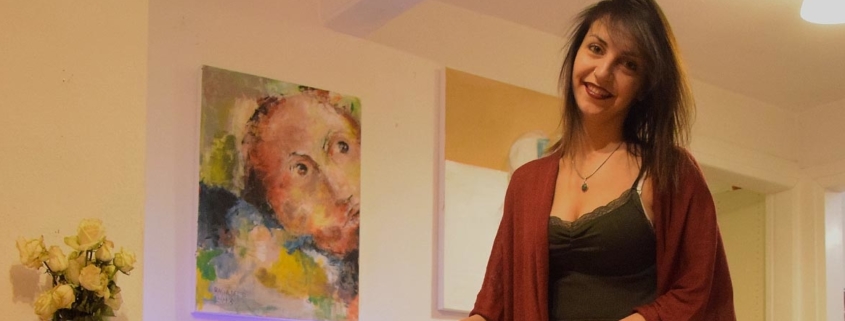 Rasha Deep
Rasha Deep
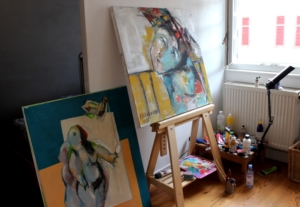
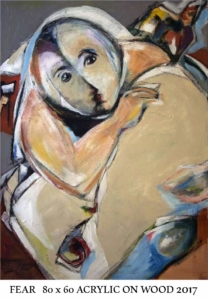



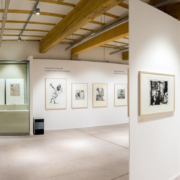 © Google Maps
© Google Maps  ©Wikimedia Commons
©Wikimedia Commons 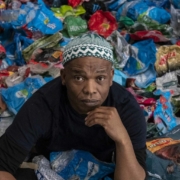

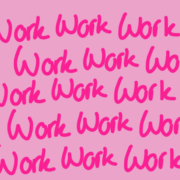

 Pexels
Pexels
Vielen Dank für diesen aufschlussreichen Beitrag, Anne. Jeder Mensch hat andere Methoden, um schwerwiegende Dinge zu verarbeiten. Rashas Erzählung, wie sie nachts durch ihre Kunst versucht hat, den Krieg vor ihrer Haustür auszublenden, ist sehr einprägsam und regt zum Nachdenken an.